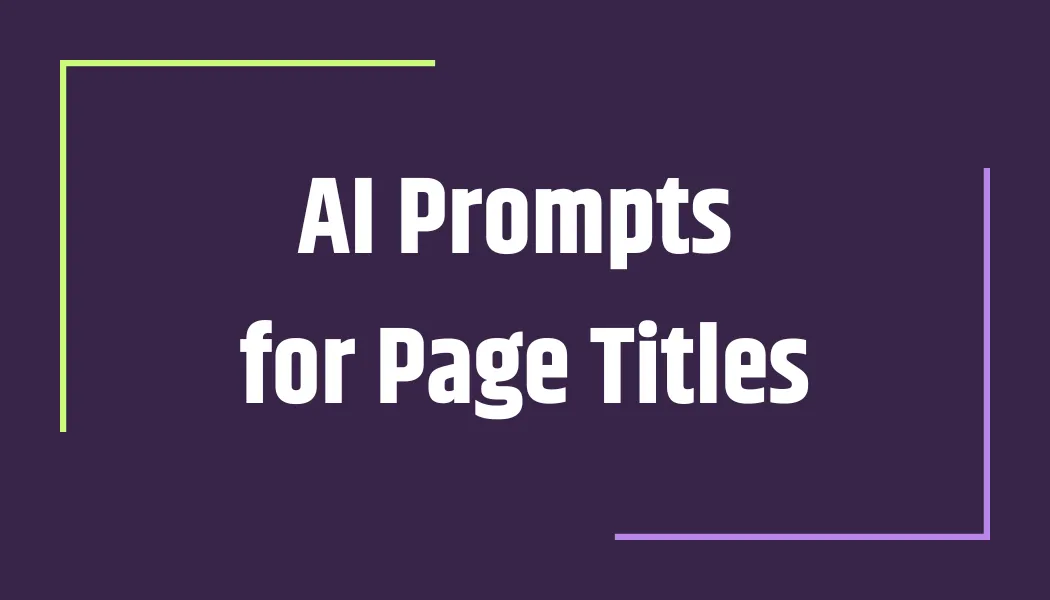AI Page Title Prompt That Beats Boring SERPs

Most AI-generated SEO titles are generic or keyword-stuffed and miss the mark on user intent. This custom AI prompt flips the script—it makes AI analyse content, competitors, and audiences before it writes your title. This results in High-converting, emotionally resonant titles that stand out in crowded SERPs and earn clicks. Attach your real data, run the prompt, and test the results.
Reclaiming Attention in a Noisy SERP
With the advent of AI, search results pages have never been more competitive. This is due to the competition having a slight edge with AI-curated titles. So, to gain an edge over those, we need to go a step further.
Your organic listing is fighting for attention with ads, featured snippets, AI overviews, site links, and even images showing up in some results. In that crowded space, your title is the first, and often only, chance to grab the user's eye.
Using generic keyword-only titles or templated titles doesn't convert. These titles blend in with everything else on the page. They lack the emotional pull, search intent, or any understanding of the user journey.
What's missing isn't AI - it's strategy.
AI can be a powerful asset if you feed it the right inputs. The real edge comes when you guide AI with a structured prompt that analyses your competition, understands your audience, and creates a headline that drives clicks.
Why SEO Titles Are Still One of Your Strongest CTR Levers
Despite Google sometimes rewriting title tags in SERPs, your original title still plays a significant role in your content's visibility and engagement.
Title tags still remain one of the strongest on-page SEO signals Google considers when understanding your page. More importantly, they directly influence whether someone clicks or keeps scrolling.
Your title is the headline on a magazine cover on the self of competing magazines. If it doesn't spark interest, value, or strong relevance, it's ignored, no matter how great the content is inside.
Once that impression is made (or missed), it often determines more than just that single visitor missed. Google tracks what users do, they track their bounce rates, dwell time, and CTR and loop that back into your ranking potential. Thus, a weak title can actually hurt your overall visibility over time.
Strong SEO titles aren't just about keywords, they're about tone and click psychology. The correct title gets you seen and clicked.
The Problem with Generic AI Title Prompts
Robotic, Repetitive Language That Kills Clicks
Most AI-powered title generators operate on shallow inputs: a keyword, maybe a topic. This results in a bland title that mainly just has related keywords in it.
Titles like:
- "Best Tools in 2025 | Brand"
- "Everything You Need to Know About [Topic]"
- "Top 10 [Product] | Brand"
They do include the target keyword most of the time, but they read in a very boring, robotic way.
These titles don't reflect brand voice, speak to the needs of your audience in reference to this specific search, or communicate why the user should visit your page.
AI doesn't naturally know how to write like a human unless you tell it how. Without strategy and structure, it defaults to the most common patterns in its training data - which, let's be honest, includes a lot of weak SEO copy written by people rushing to hit publish.
No Search Intent Matching
The biggest weakness of simple AI prompts or title generators is their inability to match search intent with a user's query.
A product page, a how-to blog post, and a service landing page have fundamentally different goals. But when AI is given a vague prompt, it will spit out the same cookie-cutter results for all three.
Blog post titles should promise information, insight, or answers.
- "How to Optimise Your Site for Voice Search in 2025"
Product pages should emphasise benefits, urgency, or differentiation.
- "Lightweight Trail Running Shoes Built for Speed & Comfort"
Service pages should focus on outcomes and trust-building.
- "Expert Tree Removal Services with Guaranteed Safety"
If you do not give AI context to help it understand your goal, you will end up with an ill-informed title that is directed at no one.
Users click relevance. Your title should reflect the type of page it's attached to and the intent behind the keywords. Without alignment, even a page ranked highly could get overlooked.
AI Prompt for SEO Titles
TOPIC=[INSERT TOPIC]
AUDIENCE=[INSERT AUDIENCE]
KEYWORD=[INSERT PRIMARY KEYWORD]
I have attached the following:
- The full content of the page this title is for (as a .txt file)
- The top 10 SEO titles currently ranking for KEYWORD
- A text file with related keywords and variations to include
- A full audience persona for the target reader
- Our brand's tone of voice, USPs, and target CTA
Please analyse the attached materials and identify:
- Common structure, tone, keyword placement, CTA types, and emotional language used in top-ranking titles
- Patterns that clearly align with the user
- Gaps or missed opportunities in current SERP titles
- The dominant search intent behind KEYWORD (informational, commercial, etc.)
- The core value proposition and key differentiators in the attached page content
Then, write 10 SEO title tags that:
- Stay under 60 characters (ideal range: 50–58)
- Include the KEYWORD close to the front
- Incorporate 1–2 related keyword variations where appropriate
- Speak directly to the AUDIENCE using emotional or benefit-driven phrasing
- Use curiosity gaps or urgency where relevant
- Are unique from existing titles in the SERP
- Align with the content provided
- End with a soft CTA or compelling hook
After writing, return:
- Each title in a numbered list, with its character count in parentheses
- A brief explanation of the search intent each title addresses
- Why each version may outperform current competitor titles in terms of CTR
What Makes This Prompt Work
It Forces AI to Actively Think Before Writing
Instead of immediately asking for a title, the prompt begins by directing AI to analyse some key inputs
- Competitors' titles
- Target audience
- Your brand voice
- The actual content of your page.
This primes the model with context before any generation happens, which is where most simple prompts fail.
This "pre-writing" phase forces AI to not just predict the word it should write next, it's evaluating what makes a title effective for your market, your message, and your users.
It Balances SEO Rules with Human Psychology
Every title output is guided by SEO constraints, keyword placement, character length, and SERP formatting. All while also incorporating soft conversion psychology like, urgency, emotional triggers, gaps, and CTAs.
This algorithmic and emotional relevance balance makes the output feel optimised and human.
How to Use This Prompt
Step 1 – Collect all Needed Data
- Collect the top 10 ranking titles for your target keyword
- Define your audience persona and tone of voice
- List USPs and CTA goals
- Enter your copy/pasted web content
Step 2 – Update the Prompt
- Fill in topic, audience, and keyword
- Paste into AI (web or API version)
- Attach your list of CTAs/USPs, Content, Audience Personas, Keywords and Competitor titles
Step 3 – Review the Output
- Review the 10 title variations with character counts
- Review the tone and audience targeting
- Ensure the CTAs are correct
Step 4 – Choose, Refine, and A/B Test
- Select 2–3 titles to test
- Review in Google Search Console for A/B testing CTR over time
Common Mistakes to Avoid
Even with a strong prompt, AI is only as good as your information. Many people miss the mark, not because AI isn't good but because they didn't use it properly.
Treating AI Output as Final
AI should be seen as a creative partner; it should not be used as a finished product. It gives you a strong draft that you should then tweak. If you copy and paste the first suggestion without editing, you are missing out on a lot of upside.
Not Customising the Audience Input
Leaving out audience persona details can lead to generic phrasing that doesn't connect. You must give as much detail as possible about your audience so AI understands who it should target.
Not A/B Testing Different Titles
Most people just assume the title they thought sounded better is the best. Even great-sounding headlines might not be optimal. You should run tests, swap two versions over a few weeks, and use tools like Google Search Console or SEO A/B platforms to check for what converted the highest CTR.
Key Takeaways
- Most AI title tools produce robotic, low-CTR headlines because they lack context, tone, and strategy.
- This prompt guides AI through a mini strategy session before writing — mirroring how a marketer would approach title creation.
- It outputs highly relevant, click-optimised titles by feeding it competitor titles, your page content, audience personas, and target CTAs.
- It combines SEO best practices (keyword front-loading, character limits) with human psychology (curiosity, urgency, benefit-driven language).
- Works across multiple page types — from blog posts and landing pages to product and service pages.
- A/B testing is key — always test different outputs in Google Search Console to refine for max CTR.
Final Thoughts
AI usage isn't about replacing marketers, it's about improving your workflow.
AI can save you time, but it's just guessing without guidance. This prompt gives structure, context, and purpose to the process — turning AI into a strategic partner instead of a random headline machine.
